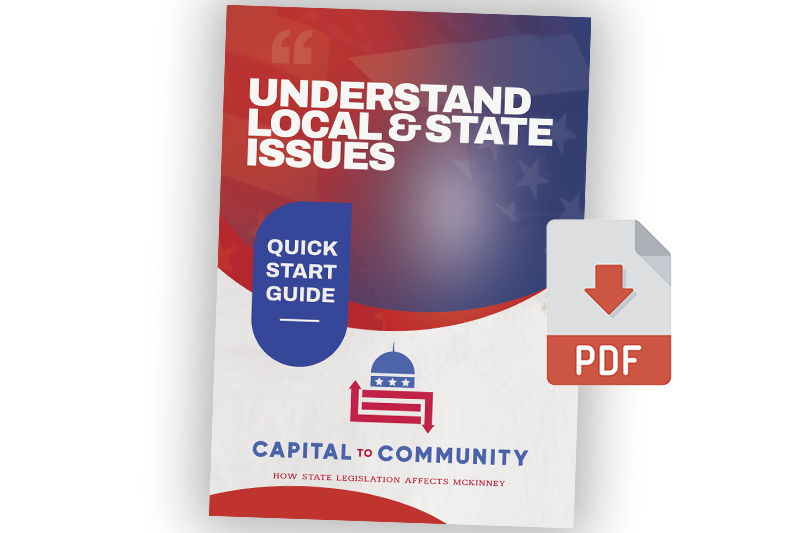the “Death Star” Bill (Texas HB 2127)
What McKinney Needs to Know About the “Death Star” Bill (Texas HB 2127)
Explain Like I'm Five
Okay, imagine you’re playing with a bunch of different toys in a big room. Each corner of the room has its own little rules—one corner says, “You can only build with blocks,” and another says, “No loud noises here.”
Now, a new rule comes along that says, “Only I get to make the rules for the whole room, and everyone has to follow them.” This new rule is called HB 2127, and it means the people in charge of the whole room (the state) get to decide the rules for all the corners, even if the corners think their own rules work better for them. It’s about making things the same everywhere, but it also means the corners can’t make their own rules anymore.
Read on to dive deeper:
The Texas Regulatory Consistency Act, also known as HB 2127 or the “Death Star” bill, represents a sweeping shift in how cities like McKinney can govern themselves. Signed into law by Governor Greg Abbott, the bill significantly limits the power of local governments to make decisions that address their community’s specific needs. Here’s what McKinney voters need to know about this controversial legislation.
What Is HB 2127?
HB 2127 restricts local governments from creating or enforcing laws that exceed what’s explicitly allowed in state law across nine major areas:
- 1.Agriculture
- 2.Business and Commerce
- 3.Finance
- 4.Insurance
- 5.Labor
- 6.Natural Resources
- 7.Occupations
- 8.Property
- 9.Local Government .
Effectively, it centralizes regulatory power in Austin, making it much harder for cities like McKinney to address local challenges. If a city ordinance conflicts with state law in any of these areas, it’s immediately void and unenforceable.
Why the “Death Star” Name?
The nickname “Death Star” reflects how the bill obliterates local control. McKinney, like other home-rule cities in Texas, has historically enjoyed the flexibility to pass ordinances tailored to its unique challenges. This bill undermines that authority, forcing cities to align with state-level rules that often fail to consider local nuances .
How Does This Impact McKinney?
HB 2127 could have profound effects on the everyday lives of McKinney residents. Here’s what’s at stake:
- Worker Protections:
Cities like Austin and Dallas previously passed ordinances requiring construction workers to receive water breaks during extreme heat. McKinney could have considered similar protections, but HB 2127 blocks such efforts. With no statewide law on mandatory breaks, workers in extreme conditions are left vulnerable . - Tenant Rights and Housing Safety:
Local governments are now barred from regulating evictions, rent control, or ensuring landlords provide safe living conditions, such as maintaining apartments at reasonable temperatures during heatwaves. These protections are critical in a fast-growing city like McKinney, where affordable housing and tenant rights are pressing concerns . - Environmental Protections:
McKinney has made strides in sustainable development, but HB 2127 restricts local authority over issues like urban farming, air quality, and water conservation. For example, cities that regulate water usage during droughts or protect neighborhoods from industrial pollution could find those rules invalidated . - Local Flexibility During Emergencies:
When disaster strikes, local governments need the freedom to act quickly. Whether it’s a natural disaster, pandemic, or economic crisis, HB 2127 makes it harder for cities to respond effectively. For instance, during COVID-19, cities enforced public health measures tailored to their communities. Under this bill, such local action could be prohibited . - Small Business and Consumer Protections:
McKinney’s local ordinances regulating payday lenders or protecting consumers from predatory practices may be invalidated unless they were enacted before January 1, 2023. This limits the city’s ability to address economic issues or provide safeguards for vulnerable populations .
Who Can Sue the City?
HB 2127 empowers any individual, business, or trade group to sue McKinney if they believe the city has violated the law by enacting ordinances outside its now-limited authority. Worse, these lawsuits could lead to significant taxpayer expenses, even for frivolous claims, because HB 2127 waives the city’s immunity and mandates that attorney’s fees be paid if the city loses .
The Arguments for and Against HB 2127
Supporters Say:
Proponents of the bill argue that it creates consistency for businesses across Texas by eliminating a “patchwork” of local rules. They claim it will make Texas more business-friendly, reduce regulatory burdens, and promote economic growth .
Critics Say:
Opponents—including cities like McKinney—argue that the bill is overly broad and vague, leaving local governments uncertain about what they can or cannot regulate. They contend it erodes home-rule authority and limits cities’ ability to address the unique needs of their communities, especially in areas like worker safety, environmental protection, and housing .
What’s the Current Status?
HB 2127 was briefly ruled unconstitutional by a Texas district court in August 2023, but the Texas Attorney General appealed the ruling. While legal challenges are ongoing, the law went into effect on September 1, 2023. The ultimate decision now lies with the Texas Supreme Court .
Why Should McKinney Voters Care?
McKinney is one of the fastest-growing cities in Texas, with unique challenges that require local solutions. This bill threatens the city’s ability to respond to its growth, protect its residents, and preserve the quality of life that makes McKinney special. Whether it’s ensuring worker safety, addressing affordable housing, or fostering sustainable growth, McKinney’s ability to act in its residents’ best interests is now at risk.
What Can You Do?
As voters and community members, it’s important to stay informed and advocate for local priorities. McKinney’s city officials are actively pushing back against HB 2127 to preserve the city’s home-rule authority . You can support these efforts by:
1.Contacting State Legislators: Let your representatives know how you feel about HB 2127.
2.Staying Engaged: Attend city council meetings or legislative updates.
3.Voting: Ensure you participate in elections that shape McKinney’s future.
McKinney deserves the power to make decisions about its own future. Let’s protect that right.
Download the Quick Start Activation Guide
Download the guide to understand these core issues and how they effect McKinney directly.


